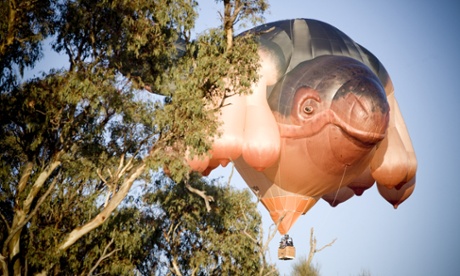
"When I look at my own middle son, Lochie, who is 19 now, skateboarding," says Scott Rankin, creative director of Big Hart, "I know that elite artisanship is in good hands. His dexterity and command over every form of his young male body and testosterone is so refined and so brilliant, I can see he is discussing the future." For Rankin, this is how he defines culture. "How we discuss what comes next."
Culture Wars is a discussion at the Sydney writers' festival taking the latest issue of the Griffith Review, titled Cultural Solutions, as its launching-off point. The four panelists have all written essays for the publication, which editor Julianne Schultz describes as looking at the ways culture can transform lives. It is a response, she says, to the idea of "people as the cultural solution to solve all problems."
Jim Hearn, a chef turned cultural researcher, takes on the notion that culture is everything. The study of the way workers interact with in banks, he says, has the same validity as studying Sydney's Vivid or Adelaide's festival of arts. "We are all subject of culture," he says, "whether we like it or not. We can leave society and go to a desert island [...] but we can never leave culture." Even on that desert island, the way we would think, and the language that we would think in, would be completely informed by the culture we came from.
Taking this all-pervasive view of culture, the panelists' work intersects with questions of whose voices are being heard? This is something Rankin has been invested in with Big Hart for many years.
"If you're discussing the future, and you're invisible in that future, you don't have a future," he says. When we have discussion about the value of culture, we can get caught up in notions such as "hotel nights sold". What about the culture of changing someone's life, of giving someone a future? His son communicates about his future through skateboarding. How many other ways can people be given this voice?
When Hearn worked with community arts access programs, he found out how much people wanted to engage. "They wanted to talk. They wanted someone to listen. They were happy to talk," he says. Talking, too, was important, because often "they were terrified to write." It is about offering avenues of entry to include the maximum number of people.
These questions have always been important for artist and festival director Robyn Archer, who has commissioned work from Big Hart, but who also has an emphasis on large public sculptural work in her festivals - most recently Sky Whale for the Centenary of Canberra. This is about appreciating that everyone has a voice, and also everyone deserves access to arts. She says, "even if you're in the most privileged position in the arts [as a festival director], it is about the openness to bring in other ideas, and them have their way."
As author of Boy, Lost, but also as a consumer of culture, Kristina Olsson is interested in the ways that novels create more empathy in readers, "which I think we need more than ever now in terms of what is happening to the world, and is happening to the culture."
Even as these panelists speak about listening to others, to observing how we all interact with the world, and about wanting to provide people with a voice, they are still finding they must question their own interaction with the culture. Speaking about how our society makes invisible thousands of seafarers who allow for global shipping, Rankin reflects on how he, too has made voices invisible. Recently reading Clare Wright's The Forgotten Rebels of Eureka, he was forced to question theatre he had previously made about Eureka. "How dare I exclude women from the culture?"
Says Archer, "in the end it's about valuing," it's about questioning whose voices we value, and how we all listen to those voices: because we're connected into the same cultural discussion.

